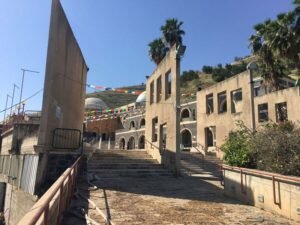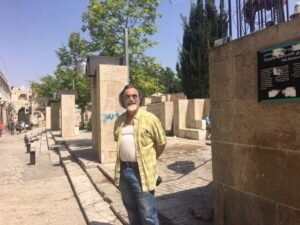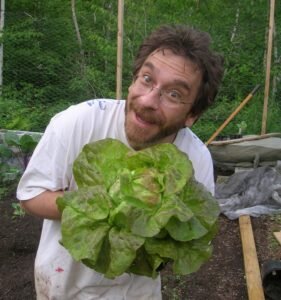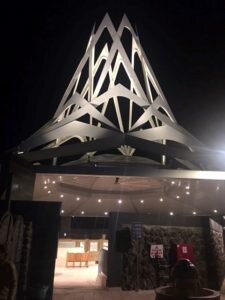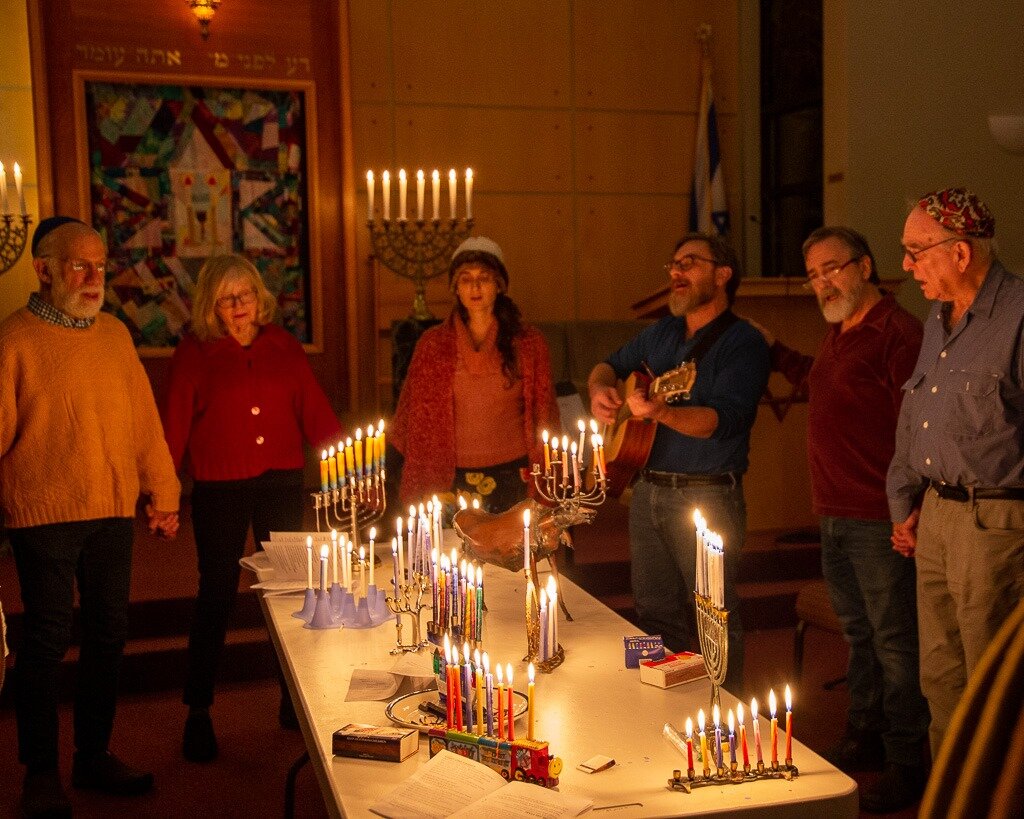Rabbi David Edleson & Tim Owings
Interview by Jan Zatzman Orlansky
When interviewing couples, it’s always the surprises that stand out and become highlights in the Getting To Know You series. Tim Owings was the big surprise for me, because he appears to be relatively quiet and thoughtfully and purposefully stands in the background, to let his partner, Rabbi Edleson, shine. Tim is highly accomplished and a very articulate professional, and if he hadn’t agreed to do this interview, it may have taken us a lot longer to get to know him. Throughout this article are photos of some of the projects that Tim has collaborated on while living in Israel.
Rabbi Edleson, on the other hand, is not reticent at all, he is ebullient! He generously shares his life with anyone who will listen. Together they are a dynamic duo who share a love for each other and of gardening, music (although not necessarily the same kind of music), a real joy in studying Judaism and are productive and giving members of their communities, whether it is in Vermont, New York, or Israel. Most importantly, they both have a terrific sense of humor.
Tim went to Georgia Tech, where he studied Architecture, or what he likes to call “Architorture.” When he left architecture, he went to beauty school in New York. He has been in the beauty business for the past 23 years in Burlington VT, and some of our congregants are his clients. His favorite quote cracks me up, “This is a comb, not a wand!”
Rabbi Edleson tells of a time when his mother, who he describes as one of the biggest influences on his life, called him home from high school because of a family emergency. “I rushed home to find my sister and my mother in the living room watching TV. “Sit down, quick!” my mother said. We can’t decide about this new program. I think it is hysterical but I wonder what you think.” “You called me home for this?”, says young David “It’s just public school,” said David’s Mom. She turned on the show and I immediately started howling with laughter. It was the premiere of “Mary Hartman, Mary Hartman.”
“Much more seriously, was my mother’s awareness of bigotry, racism and anti-Semitism. My mother didn’t believe in prayer in public schools, and since our Southern schools insisted on having prayers every day, including the “Lord’s Prayer” my mother drove to school every day, even when she was working as a nurse, and took us out of the class for that period. During that period, she taught us why it mattered, why it was anti-Semitic, and that it was important to stand up for what is right even when it is embarrassing or makes us feel different. I never forgot that lesson”.
Tim says that the most influential person in his life was his Aunt Bo. “She was a first-grade school teacher, and then a principal, and then superintendent of the county school system. I spent summers with her, and she taught me to love to read, to know about the plants and animals around us, and to introduce us to the larger world. She valued what my father, her brother, rejected—education. She was also a liberal, and I think much of my political leanings come from how much I loved and admired her. She was what was then called “an old maid school teacher,” but today she would be called a lesbian. She was together with her partner, another school teacher who taught Latin, for 50 years, though neither of them would ever talk about that. They were very involved in their churches. It turns out David also had an aunt who was a lesbian, or “old-maid,” first-grade school teacher, with a long-term partner.”
Their childhoods were quite different. Tim was born and raised on a farm in the tiny town of Gore, Georgia (population 300) where his family has farmed since the early 1800s. Growing up on a farm that had been in his family for generations, in a very small farm town is not unique, but it is rare these days.
Rabbi David was born in Bristol TN. After five years in Tennessee, his family moved to Georgia, where they had grown up. Because his father worked with military contracts, and because his mother liked to decorate houses, they moved every few years, living in small towns all over Georgia, from Saint Simons Island to Fort Oglethorpe, just outside of Chattanooga. His grandparents lived in a tiny town in rural northwest Georgia, where they had a drugstore and luncheon counter, and they moved to be near his grandmother, while David was in high school. Tim and David met at high school, freshman year. Tim recalls, “We met In Ms. Coulette’s Health Science class in grade 9. We all heard this super smart Jewish boy was coming to our school. He came in to class wearing a pair of white sailor pants with double-rows of buttons, something no guy in our school would ever wear, and sat next to me. We’ve been close friends ever since”.
The uniqueness of their childhoods is also worth noting. Tim says, “My father was from a very educated family, but he rejected that as pretentious, so he worked in a factory until he retired, refusing every offer of promotion. He was also anti-social and a bit of a misanthrope, and would famously just get up and walk away from someone who was talking to him if he didn’t like them. He loved birds, especially martins, and had hundreds of martin houses made of gourds up on old television antenna poles. On a more serious note, he spent much of my childhood bedridden with severe rheumatoid arthritis, and only became active again with experimental treatments. My mother was half Cherokee, and her family was very poor, and she carried that sense of deprivation her entire life. One of her talents was burning food, so whenever the smoke alarm would go off, my father would say, “time to eat!!”
Rabbi Edleson says this about his childhood: “We were the only Jews in most of the places we lived, and on top of that, my mother was a vocal political activist, working for public health and women’s reproductive rights. We had a lot of threats and some violence against us, such as an ax through the front door with an anti-Semitic note. On top of that, I was a sissy boy who liked music, reading, and dressing flamboyantly. Fortunately, my mother was quite cosmopolitan, had gay friends from her time at Emory University in Atlanta, and made it clear that sex was sex and not to be shy or ashamed of it. I’m very thankful for that.”
The question is, what was it about becoming a Rabbi that attracted David? The second question is, what was it about Architecture that attracted Tim, especially knowing that the curriculum at Georgia Tech was extremely rigorous and demanding? The third question is, what was it about hairdressing that attracted Tim after his tenure as a successful and productive architect both in the US and Israel?
Their individual answers to these queries are very interesting:
David: “I was attracted to becoming a rabbi for many reasons some of which are clear to me and others that remain out of focus. I am a deeply religious person, and have been all my life. I have always prayed and meditated, and when I don’t have an active spiritual practice, I feel I am neglecting a crucial aspect of who I am. My family was quite assimilated, and we would go years without going to or belonging to a synagogue. I started driving an hour to the nearest synagogue, served by a student rabbi from HUC. I have trouble describing just how much I felt I had found my spiritual home in Reform Judaism. I loved studying Hebrew, studying Jewish philosophy, Bible, etc. I ended up having keys to the synagogue, and I would go a couple of times a week just to sit in the sanctuary alone and pray and read. I didn’t have a bar mitzvah until I was 15, and after it, people kept saying I should be a rabbi, and my ego agreed. That summer, I went to a highly selective state-wide honors program in Chemistry, but at the career presentation, I talked about being a rabbi. In college, I switched from Chemistry to Comparative Literature, but I took religion courses, and was very active in Hillel, serving three years as President. I started communicating with HUC then. After graduation, I moved down to Atlanta to be with Tim, and I worked at the Israeli Consulate. Then we went to Jerusalem, and I discovered an entirely new and powerful layer of attachment to Judaism. I applied to some other Ph.D. programs, but I knew if I got into HUC, I was going. Of course, being gay, it was not clear if I would be allowed in, or ordained, but I felt called to be a rabbi. I also liked that it was interdisciplinary, and included scholarship, psychology, music, community organizing. It called me spiritually, it suited me intellectually, and I wanted to help other Jews, who were ambivalent or disconnected to their Jewishness, find some of the connection and depth I had come to love”.
Tim: “I chose to study architecture because I enjoyed geometry, art and drafting classes in high school. Growing up on a family farm also gave me ample opportunities to help build and design a variety of projects, including tractor sheds, bridges, feed sheds, tree houses, as well as the many repairs that are required to maintain all of the infrastructure of a working farm.
I chose Georgia Tech because I had scholarships that required that I go to in-state schools and Tech was the only decent program in Georgia then. I was also excited to live in an urban environment and the campus is in downtown Atlanta. Architecture was amazing and exciting in Jerusalem. The world of architecture in New York is mainly stressful. Two colleagues of mine were hospitalized due to anxiety and stress and I wasn’t able to enjoy other aspects of life because I was always at work. After architecture, I was in limbo for several months, including a dismal stint as a travel agent, until I completed a career assessment workbook that suggested I would find hairdressing a fulfilling pursuit. I liked that it was still connected to design and style, and I really liked working with people more directly and socially, and I liked that I could set my own schedule. I did a little research and got a scholarship to a beauty school in Manhattan and had a license and a job at Saks, Ishi and other salons before starting work in Burlington. I have loved it ever since.”
While in Israel Tim worked as an architect when they lived in Jerusalem in the 1980’s. He worked for Arie Rachmimoff in Jerusalem for two years and got to do design and create models for things like Rambam’s tomb or the Via Dolorsa. When they moved to New York for David to finish rabbinical school, Tim worked at Skidmore, Owings and Merrill.
In their spare time they share some interests but also have different interests. David says, “One of my weaknesses is that I book myself up, so don’t have as much spare time as I think is healthy. That being said, my work includes many of my favorite hobbies, like reading and music, so I satisfy my love of music through arranging songs for services, practicing piano, and learning new melodies and trope. I was a literature major, and so I love to read and try to read recent novels in Hebrew when I have enough time. I also love to garden, more flowers than vegetables. Tim and I bought a place that was clear-cut and bulldozed, with the top soil sold, so establishing flower gardens on compact clay and gravel soil has been an enormous challenge, and I have really loved planning, planting and tending them. I also spend time watching TV on the couch with Tim and my poodle, Proust, as well as going for walks with the dog. I also love to cook and spend a good deal of time cooking.”
In Tim’s spare time he prefers to take long walks in the woods and has since he was a little boy. “We are lucky to live in a place where I can walk out my back door and be in the woods for miles. I also like building projects, and stargazing through my telescope, a gift from David. I also really like watching TV, everything from Game of Thrones to Survivor, RuPaul’s Drag Race to True Blood. Music wise, I still love to listen to the radio, top 40. Driving back and forth to work and listening to the radio is one of my happy places”.
Proudest moments in Tim’s life revolve both around his life as an architect and as a hairdresser. “I’m very proud of the work I did when we lived in Jerusalem. For someone that young to be working on Rambam’s tomb was thrilling. I’m also very proud of my salon. We have created a comfortable, social space that both the stylists and the clients seem to really enjoy. I find it very rewarding to create a space where people are genuinely happy and feel respected and valued”. Tim says that the three most rewarding things that he has done are: moving out of Georgia, helping to design a project in Jerusalem and living with a Rabbi!
David’s proudest moments center around his fighting to be ordained as a gay man and also the work that he did as a Rabbi leading a deaf Jewish community. “…. having to fight to be ordained and then another fight at Kibbutz Lotan about being gay, all during the AIDS crisis when so many of my friends were dying, I became pretty fed up and ‘burnt out’ with institutional Judaism. Instead of leaning in, I took a step back, and while I understand why I did, in hindsight, I wish I had had more fight and strength to stay with it. On the other hand, I am profoundly proud of the work I did with the deaf Jewish community in New York, setting up services that were participatory, deaf-and-sign focused, and joyous”. David says that the two most rewarding things that he has done is staying in a relationship with Tim for 35 years, and fighting for and gaining ordination for LGBT rabbis in the Reform Movement.
Partly in jest, but also in seriousness Tim says that the most difficult thing he has done in his life is “living with a Rabbi!”
David reflects on the difficult moments in his life: “Living through the AIDS crisis in New York city as young gay men. I was in rabbinical school, but people were dropping all around us and we had no way of knowing if we were infected at that time. I was doing Chaplaincy work in a New York hospital, and so the ‘plague’ was everywhere around me and I was myself panicked internally. In retrospect, only youth could get someone through that, and while it was incredibly difficult, it also taught me some of the most important lessons of my life about the balance of activism, direct care, self-care, and the role of spirit in life.”
David said that what attracted him to Temple Sinai was that Burlington was the perfect place for a vibrant, fun, growing Reform community, and that Sinai had such tremendous potential. After he met everyone, during the interview process, and saw what a vibrant, creative and fun community we were, he really wanted to be able to be part of it.
Tim had visited Vermont often with David’s parents and loved it. Both David and Tim had good friends here, so when they decided it was time to leave New York, Vermont was an obvious choice. They also checked to see which counties in Vermont had the most liberal voting record and that’s is how they settled on Lincoln VT.
Both David & Tim have visions of what they would like to see Temple Sinai doing in the years ahead. Tim would like to do some construction projects at Sinai along with interested congregants. He would like to work on some building projects like a playground for the children, a nicer patio out back, and an indoor playroom. David would like to see more musical variety during our services and also would like to focus on a project that congregants could do together. He would love to see more play spaces for the children and more outdoor activities such as gardening, hiking and kayaking together.
Both Tim & David enjoy traveling and have had rich travel experiences. Here are David’s recollections: “We both love to go to Israel and to Italy. We first went to Israel about a year after we had moved in together, and we stayed in Jerusalem for two and a half years. We’ve been to India, Italy several times, France, England, and the Caribbean. One memory that stands out for me was leading High Holy Day services in San Salvador in 1986, when there was a massive earthquake that destroyed large neighborhoods. They didn’t know English and I didn’t know much Spanish, but together we called off all but the most central services and instead, we helped dig people out of the rubble.”
Tim also has travel recollections: ….”for me nothing can compare with Jerusalem. Getting to live a few years there when I was young changed my life and it will always be home for me at some level. But I also love Italy, and am happy to go back again and again. Recently we spent a few days in Athens, Greece and I would love to go back – great city.”
There are events in both their lives that probably few people know about. Tim says that they got to watch Logan’s Run in a Tel Aviv hotel room with, musician Leonard Bernstein. David worked at the Israeli Consulate in Atlanta after he graduated from William and Mary, and got to be Bibi Netanyahu’s personal driver for three days, back when he had just become the UN Ambassador for Israel. Today with Netanyahu’s policies and approaches, the memory is more complicated.
Finally and optimistically, Rabbi Edleson has thoughts on the direction he would like to see Temple Sinai moving toward: “…..a direction of joyous spiritual life and committed social action. Judaism should be fun, joyous, moving, deep, and satisfying. When it become mostly a chore, we are doing it wrong. Creating a genuine sacred spiritual community at the center of our congregation is key to attracting younger spiritually-minded families, and so I want to keep the social fun going while focusing on building a sacred community of spirit.“
How lucky we are to have the talents of Tim Owings and Rabbi David Edleson, as well as their enthusiasm for making a difference in our community! Thanks to both of you for being so candid and for sharing the stories of your lives with us.

